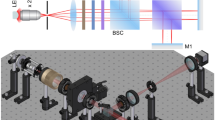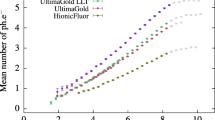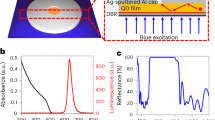Abstract
METHODS used for obviating the effects of variation of sensitivity over the photocathode of a multiplier photocell (of the ring-dynode type) generally involve loss of sensitivity1. This loss may be avoided by the use of a rotatable mirror, so as always to direct the measured light to the same cathode region2, or of a scalloped grating which diffuses the cathode illumination3. From the work to be described it is concluded that the required smoothing of cathode response can also be obtained very simply by exploiting the diffraction at a sufficiently small hole placed before the photo-cathode.
This is a preview of subscription content, access via your institution
Access options
Subscribe to this journal
Receive 51 print issues and online access
$199.00 per year
only $3.90 per issue
Buy this article
- Purchase on Springer Link
- Instant access to full article PDF
Prices may be subject to local taxes which are calculated during checkout
Similar content being viewed by others
References
Saunderson, Caldecourt and Peterson, J. Opt. Soc. Amer., 35, 681 (1945).
Naish, J. M., J. Sci. Instr., 28, 138 (1951).
Baker, L. R., J. Sci. Instr., 32, 418 (1955).
Kessler and Wolfe, J. Opt. Soc. Amer., 37, 133 (1947).
Author information
Authors and Affiliations
Rights and permissions
About this article
Cite this article
NAISH, J. Photometry with Multiplier Photocells. Nature 179, 269–270 (1957). https://doi.org/10.1038/179269a0
Issue Date:
DOI: https://doi.org/10.1038/179269a0
Comments
By submitting a comment you agree to abide by our Terms and Community Guidelines. If you find something abusive or that does not comply with our terms or guidelines please flag it as inappropriate.



